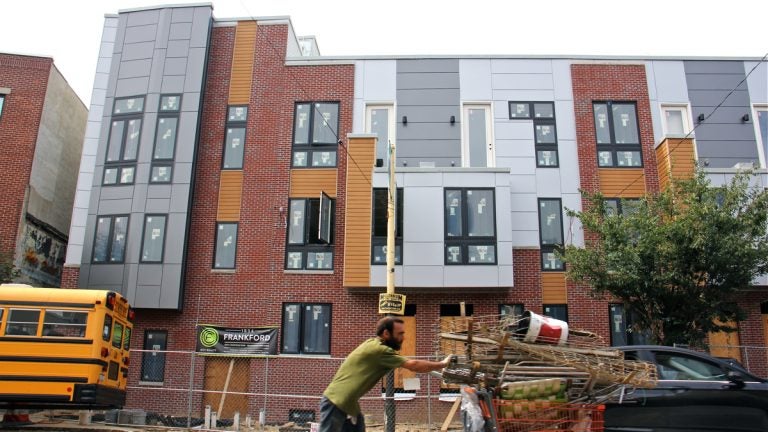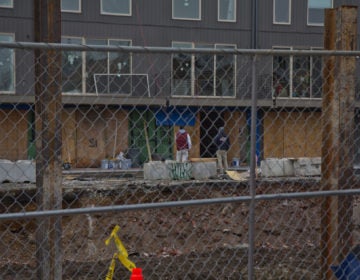Philly Council moves to phase down abatement after abandoning cap on tax break
A bill that aims to “phase down” Philadelphia’s controversial 10-year tax abatement on residential construction got introduced at City Council Thursday.

This November 2019 photo shows new condos at 1834 Frankford Avenue (Emma Lee/WHYY)
A bill that aims to “phase down” Philadelphia’s controversial 10-year tax abatement on residential construction was introduced at City Council Thursday. The meeting was the last opportunity to introduce legislation before the council session ends, and new legislators change the political dynamics.
The bill introduced would phase out the abatement, reducing it by 10% each consecutive year. Another piece of legislation that would increase the value of the city’s Homestead Exemption for homeowners was also introduced.
But as those two bills moved forward, another abatement reform measure failed to make it to the floor. That bill, in discussion as recently as Thursday morning, would have capped the value that can be exempt from taxes under the abatement. The real estate industry, including developers and building trades unions, oppose any form of cap.
“There’s not going to be a cap introduction anymore — I was opposed to the cap from the start,” said Bobby Henon, the Majority Leader and an ally of the city’s building trades unions. “I look forward to a conversation about the phase-out modification.”
Philadelphia offers the 10-year abatement on property taxes for new construction and rehabilitation projects as an incentive for development and a counterbalance to the city’s high building costs. But the incentive is controversial with neighborhood groups and education advocates, who see it as a force of gentrification and a drain on school funding.
The reform measure that moved forward Thursday only applies to new residential construction, leaving the abatement on rehabs and commercial and industrial properties unchanged.
Critics inside and outside of City Hall have called for changes to the abatement for years. Councilmember Helen Gym has introduced at least four different proposals while Allan Domb and Cindy Bass have each come forward with proposals of their own. None have made it as far as a hearing.
City Council is expected to move to the left in January. Working Families Party candidate Kendra Brooks won her seat with an explicit call to kill the abatement. Gym said she expects a push for full repeal if substantive reforms aren’t made in the few remaining weeks of this term.
“Most people in the city of Philadelphia think it should be adjusted,” Council President Darrell Clarke said Thursday. “The economy has changed; the market has changed; the abatement achieved its goal of stimulating significant growth.”
The supporters of more aggressive reforms were disappointed in the loss of the cap legislation but were pleased that change of any kind was moving forward after years of inaction.
“Something is better than nothing,” said Councilmember Maria Quiñones-Sánchez, who has advocated for changes to the abatement for years. “I understand we need 12 votes, and I’ll work towards any consensus that moves us towards reform.”
The phase-down legislation would go into effect on July 1, 2020, while the increase in the Homestead Exemption will go into effect in 2021. The abatement reform includes a provision that requires a review every three years to evaluate economic impacts.
Leo Addimando, a Philadelphia developer and vice-president of the Building Industry Association, a trade group, urged the council to reconsider the timeline for the abatement reduction.
“We are studying the impact that a declining 10-year abatement will have on the viability of residential and mixed-use development in Philadelphia. What’s for certain is that implementation in 6 months doesn’t work,” said Addimando. “In most cases, it takes years not months from property acquisition to get a building permit. And with the building permit being the point at which the abatement can be enacted, more than a 6-month window is needed to allow the hundreds of projects already in the works to have the current rules applied to them.”
WHYY is your source for fact-based, in-depth journalism and information. As a nonprofit organization, we rely on financial support from readers like you. Please give today.







